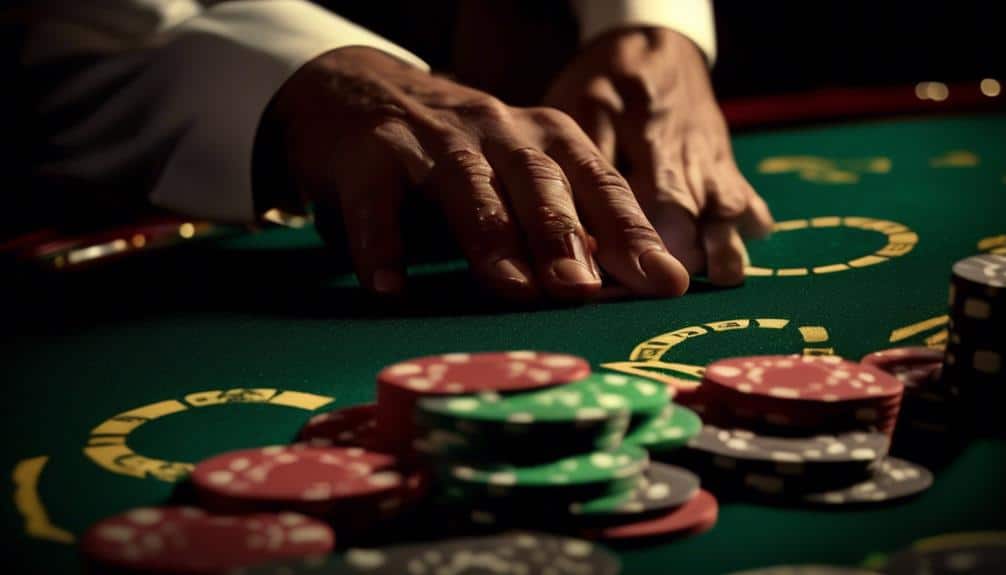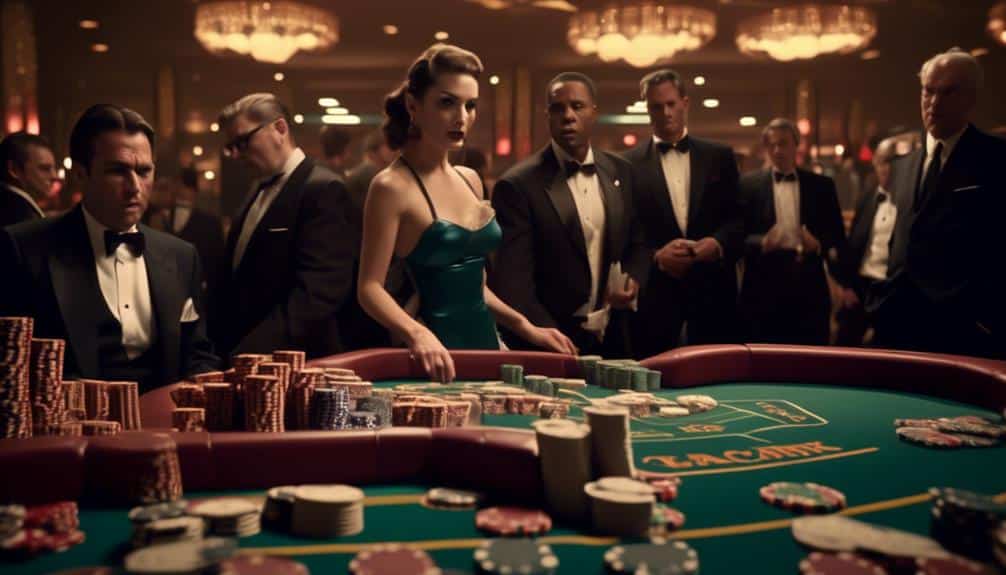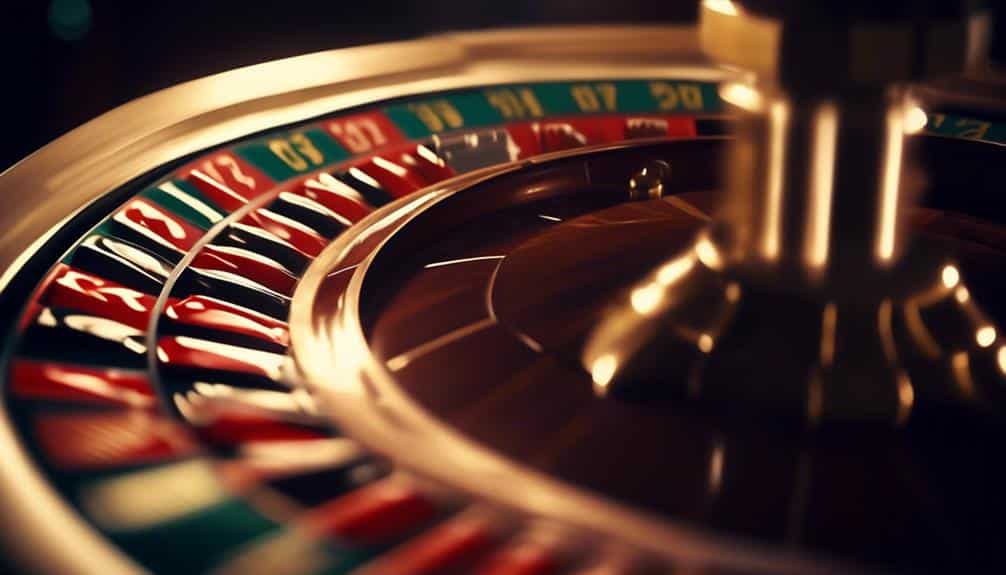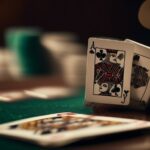Imagine yourself stepping into a bustling casino, the air thick with anticipation and the sounds of spinning roulette wheels and clinking slot machines. You can’t help but wonder why mathematicians, with their analytical minds and number-crunching abilities, aren’t reigning supreme in this world of chance.
As you soon discover, the answer lies in the intricate web of probabilities that always favors the house. But don’t be discouraged just yet. There are fascinating stories of mathematicians who dared to challenge the odds only to face the wrath of casinos.
So, sit tight and prepare to uncover the secrets of why mathematicians aren’t ruling the gambling industry.
The Casino Always Has the Edge

The casino always has the edge in probabilities, making it challenging for gamblers, including mathematicians, to profit consistently. Regardless of the game, the casino’s advantage is ever-present. Even in games like blackjack, where players can use strategies to improve their odds, the house still maintains an advantage due to the house edge. This means that the casino will always come out on top over time.
Mathematicians, with their ability to calculate probabilities, may have an advantage in understanding the odds, but it doesn’t guarantee consistent profits. Understanding the house edge is crucial for gamblers who hope to have any chance of success. Probability calculations can inform their decisions, but luck still plays a significant role in determining outcomes.
It is important to recognize that consistently winning in gambling is extremely challenging. The unpredictability of outcomes and the influence of luck make it nearly impossible to beat the casino consistently. While strategies and mathematical calculations can improve one’s chances, they don’t guarantee success. Gambling should be seen as entertainment rather than a reliable source of income. The casino always has the edge, and it’s wise to approach gambling with this understanding.
Mathematicians and Strategies in Blackjack
Mathematicians have utilized mathematical strategies to enhance their chances of winning in blackjack. While the casino always has the edge, these strategies can help tip the odds slightly in the player’s favor. Here are three key strategies mathematicians use in blackjack:
- Counting cards: This technique involves assigning a value to each card dealt, allowing players to keep track of the ratio of high-value to low-value cards remaining in the deck. By doing this, mathematicians can adjust their bets and playing decisions accordingly, increasing their chances of winning.
- Probability calculations: Mathematicians use probability theory to calculate the likelihood of certain events occurring in blackjack. This enables them to decide when to hit, stand, double down, or split their cards, maximizing their potential winnings.
- Simulations and analysis: With advancements in computing power, mathematicians can run simulations and analyze vast amounts of data to find optimal strategies in blackjack. These simulations help them understand the expected value of different betting and playing decisions, allowing them to make more informed choices at the table.
While these strategies can improve a player’s chances in blackjack, it’s important to remember that luck and chance still play a significant role. The casino has implemented measures to counter these strategies, such as using multiple decks and shuffling more frequently.
Therefore, consistently winning in blackjack is extremely challenging and should be seen as a form of entertainment rather than a reliable source of income.
The Success and Ban of the MIT Blackjack Team

The success and subsequent ban of the MIT Blackjack Team exemplify the ongoing battle between casinos and strategists who employ mathematical techniques to gain an edge in gambling.
The MIT Blackjack Team, comprised of students and alumni from the prestigious Massachusetts Institute of Technology, used their mathematical prowess to beat the casinos at their own game. By employing card counting and advanced strategies, they were able to turn the odds in their favor and achieve remarkable success in the game of blackjack.
However, their success didn’t go unnoticed by the casinos. As the team’s winnings continued to grow, casinos became suspicious and started closely monitoring their activities. Eventually, the MIT Blackjack Team’s strategies were detected and banned from playing in most casinos.
The ban served as a clear message to other mathematicians and strategists that casinos wouldn’t tolerate attempts to outsmart them using mathematical techniques. The story of the MIT Blackjack Team serves as a cautionary tale for mathematicians and gamblers alike. While it’s possible to gain an advantage through mathematical strategies, casinos won’t hesitate to ban those who threaten their profits.
The ban imposed on the MIT Blackjack Team highlights the ongoing battle between casinos and individuals who seek to use mathematics to gain an edge in the gambling industry.
The Role of Mathematics in Gambling Strategies
After witnessing the ban imposed on the MIT Blackjack Team, it becomes evident that mathematics plays a crucial role in developing effective gambling strategies. While it may not guarantee consistent wins, understanding the role of mathematics can enhance your chances of success in gambling.
Here are three ways in which mathematics influences gambling strategies:
- Probability Analysis: Mathematicians use probability theory to assess the likelihood of certain outcomes in games of chance. By analyzing the probabilities, they can make informed decisions on when to bet, when to fold, and when to stay in the game.
- Game Theory: Mathematics also plays a significant role in game theory, which involves analyzing strategic interactions between players. By studying the rules of the game and the decisions made by opponents, mathematicians can develop strategies that exploit weaknesses and maximize expected gains.
- Bankroll Management: Proper bankroll management is essential in gambling. Mathematicians understand the importance of setting limits and allocating funds wisely to minimize losses and maximize potential profits. They use mathematical models to determine optimal betting sizes and to manage risk effectively.
While mathematics can improve your strategies, it’s important to remember that luck and chance still play a significant role in gambling outcomes. By incorporating mathematical principles into your approach, you can make more informed decisions and increase your chances of success. However, it’s crucial to temper your expectations and view gambling primarily as entertainment rather than a reliable source of income.
The Significance of Luck and Chance in Gambling

Luck and chance play a significant role in determining the outcomes of gambling activities. Despite the efforts of mathematicians to develop strategies and calculate probabilities, the influence of luck and chance can’t be underestimated in the gambling industry. While mathematical strategies can improve the odds and help make informed decisions, they can’t guarantee consistent wins. Luck heavily influences gambling outcomes, which can override even the most well-thought-out calculations. The element of chance adds an unpredictable factor to the equation, making it difficult for mathematicians to profit from gambling consistently.
In the quest to conquer the gambling industry, mathematicians have recognized the importance of incorporating luck and chance into their strategies. They understand that no matter how precise their calculations are, there’s always an element of uncertainty that can’t be eliminated. This recognition has led mathematicians to approach gambling as a form of entertainment rather than a reliable source of income.
While mathematicians have made significant contributions to probability and developed strategies to improve the odds, they haven’t been able to dominate the gambling industry completely. The significance of luck and chance remains a constant reminder that mathematical calculations don’t solely determine gambling outcomes. Ultimately, the unpredictable nature of luck and chance keeps the gambling industry thriving, and mathematicians continually search for new ways to navigate its complexities.
Consistently Winning in Gambling: A Major Challenge
In the pursuit of consistently winning in gambling, mathematicians face the daunting challenge of overcoming the inherent unpredictability of luck and chance. While they may possess a deep understanding of probability and employ complex mathematical calculations, the nature of gambling makes it a major challenge to achieve consistent success.
Here are three reasons why consistently winning in gambling is so difficult:
- Uncertainty of outcomes: Gambling relies heavily on luck and chance, making it impossible to predict the outcome of each game accurately. No matter how advanced a mathematician’s strategies or calculations may be, they can’t control or accurately forecast the random elements that ultimately determine the result.
- The house always has an edge: Casinos and bookmakers design their games and odds to ensure a slight advantage over the players. This built-in advantage, known as the house edge, ensures that the casino will make more money in the long run than the players. While mathematicians can improve their odds and minimize losses, they’re still against a system designed to favor the house.
- Short-term success vs. long-term consistency: While some individuals may experience short-term success in gambling, achieving consistent and sustainable winnings is incredibly challenging. Variance and fluctuations in luck can lead to winning and losing streaks, making it difficult to maintain consistent profitability over time.
Gambling as Entertainment, Not a Source of Income

Gambling, while often enticing and thrilling, should be approached with the understanding that it’s primarily a form of entertainment rather than a reliable source of income. Although some individuals may experience occasional wins, consistently winning in gambling is rare. The odds are stacked against players in casinos, as the house always has an advantage.
Luck and chance play significant roles in determining the outcomes of gambling activities. Even with games like blackjack, where players can use strategies to improve their chances, the casino still maintains an edge in probabilities. The success of the MIT Blackjack Team, who were able to turn the game in their favor using mathematical strategies, highlights the exceptional nature of their achievement. However, this success was short-lived, as casinos eventually banned the team.
While mathematics can assist in making informed decisions and improving strategies, it can’t guarantee consistent wins. Therefore, it’s crucial to approach gambling as a form of entertainment rather than relying on it as a reliable source of income. Enjoy the thrill and excitement of gambling, but always remember that the odds aren’t in your favor.
Experience seamless communication with W88 via Tawk.to, where their dedicated support team is ready to provide real-time solutions and guidance.
Frequently Asked Questions
Why Mathematical Probability Failed to Emerge From Ancient Gambling?
Mathematical probability failed to emerge from ancient gambling because the concept of probability had not yet been developed. People relied on superstition and luck rather than mathematical analysis to make decisions in gambling.
What Is Probability Math in Gambling?
Probability math in gambling involves calculating the likelihood of specific outcomes. It helps analyze odds, determine betting strategies, and assess risks. Understanding it can inform decisions and develop effective strategies, but luck also plays a significant role.
What Is the Mathematical Theory of Gambling?
The mathematical gambling theory involves calculating probabilities and analyzing game patterns to make informed decisions. It can improve strategies and help make informed decisions, but luck and chance still play a significant role in gambling outcomes.
Is Gambling Luck or Probability?
Gambling is a combination of luck and probability. While mathematics can help inform decisions and manage risks, luck still plays a significant role in determining outcomes. Consistent winning is challenging, making gambling more of an entertainment than a reliable source of income.
How Can Probability Theory Be Applied to Gambling and Keno?
When it comes to gambling and Keno, understanding the beginner’s guide to Keno odds can be a game-changer. Probability theory can help players calculate their chances of winning and make more informed decisions when placing bets. By applying probability theory, gamblers can gain an advantage and improve their overall success in Keno.
Conclusion
In conclusion, while mathematics can certainly enhance strategies and decision-making in gambling, the inherent advantage held by casinos makes it extremely difficult for mathematicians to dominate the industry. The story of the MIT Blackjack Team serves as a testament to the potential of mathematical prowess but also highlights the subsequent banning by casinos.
Ultimately, luck and chance play a significant role in gambling outcomes, making consistent winning daunting. It’s important to view gambling as a form of entertainment rather than a reliable source of income.







